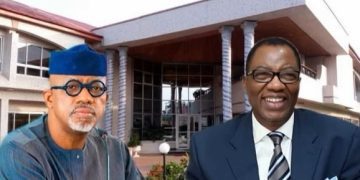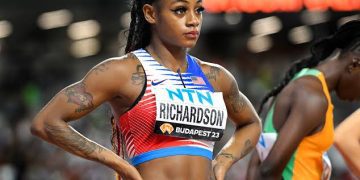Ebenezer Olaolu Mabinuori, professionally known as Ebonny Musik is a fast rising musician. The Olabisi Onabanjo University (OOU) Ago-Iwoye – trained Biochemist speaks about the nation’s music industry, further study in UK and his ultimate goal as a musician.
Excerpt:
Growing up in Lagos, Nigeria, within a royal family, how did your background shape your outlook on life and your passion for music?
My real name is Ebenezer Olaolu Mabinuori and professionally known as Ebonny Musik. I was born in Lagos, Nigeria, and raised in a royal family. My dad had a collection of classics from Michael Jackson, Fela Anikulapo Kuti and Sade Adu he had bought in the US, so I was privileged to listen to many of those songs which ignited my love for good music.
You initially had a strong interest in football before transitioning to music. What was the turning point that made you fully embrace music as your calling?
Growing up, I was passionate about sports and won several medals for my school. What I love most about football is its ability to unite people—it’s more than just a game of winning or losing; it teaches teamwork, endurance, and perseverance. However, frequent injuries led me to drift away from football. I found comfort in music, a universal language that connects people from diverse cultures. My goal is to make a positive impact on many lives, and music became the perfect path to achieve that. I’m grateful for the journey so far and the experiences that have shaped me along the way.
Attending Olabisi Onabanjo University and studying Biochemistry is quite different from the world of music. How did your university experience influence your artistry?
In the past, most African parents prioritized education, expecting their children to go to school, earn a degree, and secure a 9-to-5 job, often with little regard for their passions. My parents strongly believed in the “education first” approach, so I had to enroll in medical school. However, I found a way to balance my studies with music to keep my dream of becoming a superstar alive. During that time, I created great records and became well-known on campus for my music.
Your early music gained popularity within your university community. What was that experience like, and how did it fuel your ambition to take your music to the next level?
The love and support I received back then were overwhelming. During my university days, I had a close group of friends with whom I rehearsed and performed at various campus events. We were the stars of the school, and the constant praise from fellow students reassured me that I was on the right path. It strengthened my belief that I was destined to make it big in the music industry one day!
You’ve worked with some notable industry professionals like Indomix, Killertunes, and Seriki Alapomeji. What key lessons have you learned from these collaborations?

Collaborating with Indomix in 2015 marked a significant turning point in my career. His professional touch on my song ‘My Flow’ reinforced my belief that stardom was within reach. The following year, 2016, was equally remarkable. I met Killertunes in Surulere, and within just 15 minutes, he created a beat from scratch. His brilliance left me in awe and further motivated me to pursue excellence in my craft. However, I decided not to release the song we worked on because I envisioned Olamide on the track but couldn’t get in touch with him, so I chose to hold onto it for the future.
“Drop Down” with Seriki Alapomeji and Stormy Zino was a major street anthem. What was the creative process behind that song, and did you anticipate how well it would be received?
I aim to help shape the future of the industry and inspire others to pursue their dreams no matter the obstacles. Ultimately, I want my music to be a bridge that connects people around the world.
Oh! that a special record, and the energy in the studio while creating it was incredible. The process was organic, we vibed off each other’s energy, and the synergy was just right. The beat had that raw street feel, and we wanted to make something the streets could connect with instantly. As for the reception, we knew we had made a solid record, but the way it blew up was beyond our expectations. Seeing people vibe to it, word for word, on the streets and at events was a surreal experience. It just proved that when you make music with authenticity and passion, the audience will feel it.
After years of pushing your music as an independent artist, you took a break to recharge and further your education in the UK. What led to that decision, and how has that period influenced your music now?
Taking a break after years of pushing my music independently was a tough but necessary decision. The journey had been intense, and I felt the need to step back, recharge, and gain new perspectives. Furthering my education in the UK wasn’t just about academics; it was also about personal growth and expanding my horizons.That period allowed me to experience different cultures, sounds, and creative processes, which have greatly influenced my music. I’ve evolved as an artist, and my sound now carries a blend of my roots and the global influences I absorbed during that time. The break wasn’t a setback, it was a strategic pause that has made me even more intentional with my craft.
You’re now working with UK-based producer Christian Jude on an upcoming EP, with “Good Days Bad Days” as the first single. What can fans expect from this project, and how does it reflect your growth as an artist?
Working with Christian Jude on this upcoming EP has been an incredible experience. He understands my sound and brings a fresh perspective that complements my artistic vision. Good Days Bad Days is just a taste of what’s to come. This project is a reflection of my journey, the highs and lows, and the growth I’ve experienced both personally and musically. Fans can expect a more refined, diverse, and emotionally rich sound. I’ve explored different styles while staying true to my roots, blending Afro influences with global sounds. This EP is not just music; it’s a story, an experience, and I can’t wait for everyone to hear it.
Relocating to the UK must have been a significant shift. How has the move influenced your music style, and do you find inspiration from both Nigerian and UK music scenes?
Relocating to the UK was definitely a major transition, and it has had a huge impact on my music. Being in a new environment exposed me to different cultures, sounds, and creative processes. The UK music scene is so diverse, from Afroswing to grime and drill, and I’ve been able to draw inspiration from that while staying true to my Nigerian roots. My style now blends the raw energy of Afrobeats with the finesse and versatility of the UK sound. I find inspiration in both scenes—the storytelling and rhythm from Nigeria, combined with the unique sonic elements and production techniques from the UK. It’s been an exciting journey of growth, and I believe my music now carries a more global appeal while still keeping its authenticity.
Family support is crucial in any artist’s journey. How has your family, especially your musically inclined sisters, contributed to your growth and success in the industry?
Family support has played a huge role in my journey, and I’m grateful for that. My relatives, being musically inclined themselves, have been a big source of inspiration and encouragement. Growing up in a home where music was appreciated made it easier for me to embrace my passion.They’ve contributed in so many ways—whether it’s giving honest feedback on my songs, expressing constructive criticism, harmonizing with me during early jam sessions, or just being my biggest cheerleaders. Their belief in my talent has always pushed me to aim higher and stay consistent. Having that kind of support system keeps me grounded and motivated to keep evolving as an artist.
What are some of the biggest challenges you’ve faced as an independent artist, and how have you managed to navigate the industry despite them?
As an independent artist, some of the biggest challenges I’ve faced have been gaining recognition without the backing of a major label, managing my own brand, and handling the business side of things—marketing, distribution, and budgeting—while still focusing on creating music. It’s a lot of work, and sometimes it can feel overwhelming, but it’s taught me to be resourceful and resilient. I’ve navigated these challenges by building a strong team of people who believe in my vision, staying consistent, and using social media as a tool to connect directly with my fans. It’s all about staying authentic, working smart, and making sure I don’t lose sight of why I started in the first place: the love for music. Every setback has been a learning experience that’s pushed me to adapt and evolve in this ever-changing industry.
Looking ahead, what’s your ultimate vision for your music career, and how do you hope to contribute to the evolution of the Nigerian and global music industry?
I hope to contribute to the evolution of the music industry by being part of a movement that elevates African sounds on the global stage and encourages collaboration across cultures. By constantly dishing out good music, working with established and emerging talents, and staying authentic, I aim to help shape the future of the industry and inspire others to pursue their dreams no matter the obstacles. Ultimately, I want my music to be a bridge that connects people around the world.




































